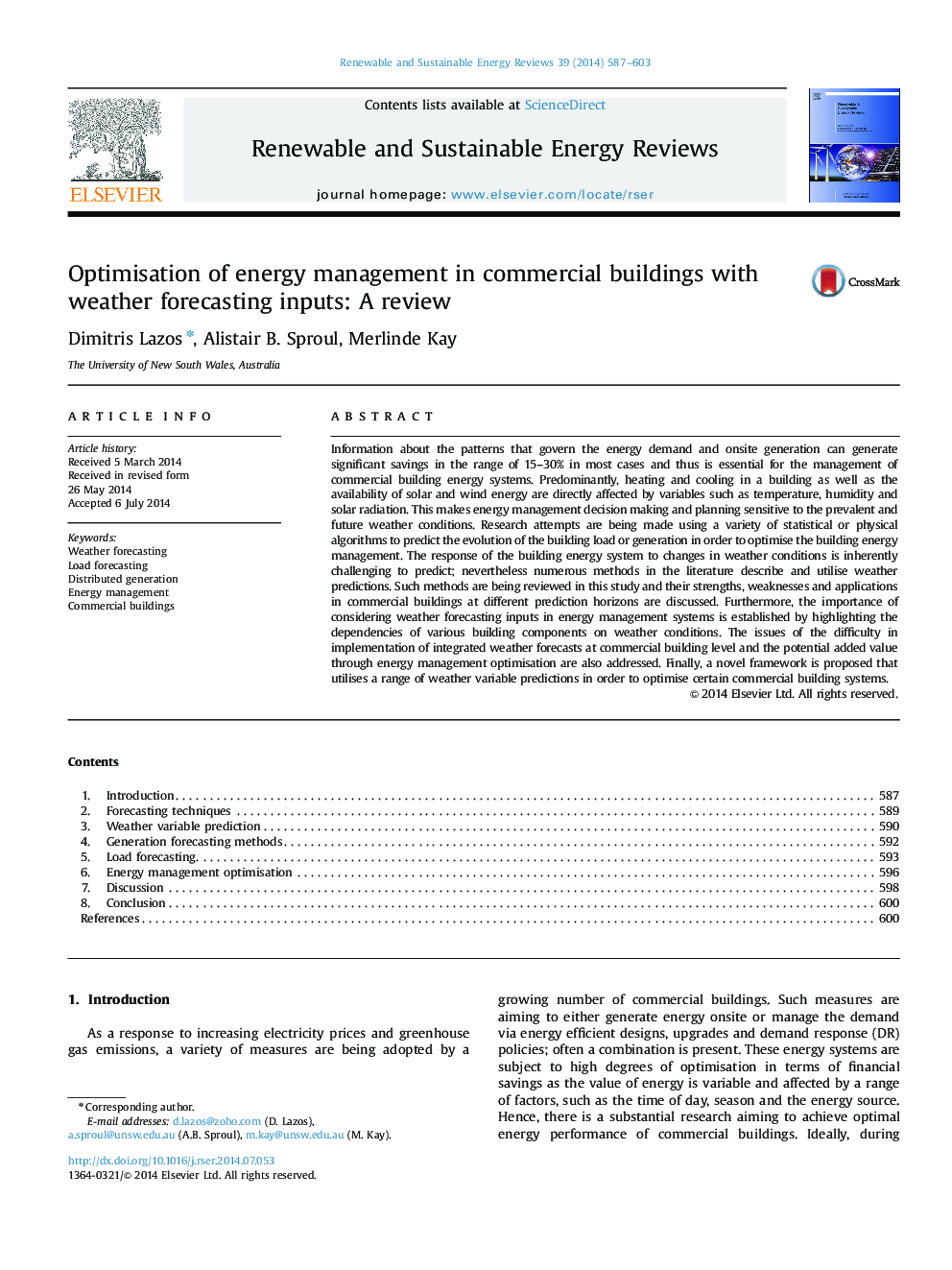| کد مقاله | کد نشریه | سال انتشار | مقاله انگلیسی | نسخه تمام متن |
|---|---|---|---|---|
| 8119056 | 1522346 | 2014 | 17 صفحه PDF | دانلود رایگان |
عنوان انگلیسی مقاله ISI
Optimisation of energy management in commercial buildings with weather forecasting inputs: A review
ترجمه فارسی عنوان
بهینه سازی مدیریت انرژی در ساختمان های تجاری با ورودی پیش بینی آب و هوا: یک بررسی
دانلود مقاله + سفارش ترجمه
دانلود مقاله ISI انگلیسی
رایگان برای ایرانیان
کلمات کلیدی
پیش بینی آب و هوا، پیش بینی بار، نسل توزیع شده، مدیریت انرژی، ساختمان تجاری،
ترجمه چکیده
اطلاعات در مورد الگوهایی که تقاضای انرژی و نسل در آن را بر عهده دارند می توانند در بیشتر موارد صرفه جویی قابل ملاحظه ای را در حدود 15 تا 30 درصد داشته باشند و بنابراین برای مدیریت سیستم های ساختمان تجاری تجاری ضروری است. به طور عمده، گرما و خنک کننده در یک ساختمان و همچنین دسترسی به انرژی خورشیدی و باد به طور مستقیم تحت تاثیر متغیرهایی مانند دما، رطوبت و تابش خورشید قرار می گیرند. این باعث می شود که تصمیم گیری در مورد مدیریت انرژی و برنامه ریزی دقیق به شرایط آب و هوایی شایع و آینده حساس شود. تلاش های تحقیقاتی با استفاده از الگوریتم های مختلف آماری یا فیزیکی برای پیش بینی تکامل بار ساختمان یا نسل به منظور بهینه سازی مدیریت انرژی ساختمان انجام می شود. پاسخ سیستم انرژی ساختمان به تغییرات در شرایط آب و هوایی ذاتا برای پیش بینی چالش است؛ با این حال روش های متعددی در ادبیات توصیف و پیش بینی آب و هوا را استفاده می کنند. چنین روش هایی در این مطالعه مورد بررسی قرار گرفته است و نقاط قوت، ضعف و کاربرد آنها در ساختمان های تجاری در افق های پیش بینی متفاوت مورد بحث قرار گرفته است. علاوه بر این، اهمیت در نظر گرفتن ورودی های پیش بینی هوا در سیستم های مدیریت انرژی با برجسته کردن وابستگی اجزای ساختمان های مختلف به شرایط آب و هوایی ایجاد شده است. مسائل مشکل در اجرای پیش بینی های یکپارچه آب و هوا در سطح ساختمان تجاری و ارزش افزوده بالقوه از طریق بهینه سازی مدیریت انرژی نیز مورد توجه قرار گرفته است. در نهایت، یک چارچوب جدید پیشنهاد شده است که با استفاده از طیف وسیعی از پیش بینی های متغیرهای هواشناسی به منظور بهینه سازی برخی از سیستم های ساختمان تجاری می پردازد.
موضوعات مرتبط
مهندسی و علوم پایه
مهندسی انرژی
انرژی های تجدید پذیر، توسعه پایدار و محیط زیست
چکیده انگلیسی
Information about the patterns that govern the energy demand and onsite generation can generate significant savings in the range of 15-30% in most cases and thus is essential for the management of commercial building energy systems. Predominantly, heating and cooling in a building as well as the availability of solar and wind energy are directly affected by variables such as temperature, humidity and solar radiation. This makes energy management decision making and planning sensitive to the prevalent and future weather conditions. Research attempts are being made using a variety of statistical or physical algorithms to predict the evolution of the building load or generation in order to optimise the building energy management. The response of the building energy system to changes in weather conditions is inherently challenging to predict; nevertheless numerous methods in the literature describe and utilise weather predictions. Such methods are being reviewed in this study and their strengths, weaknesses and applications in commercial buildings at different prediction horizons are discussed. Furthermore, the importance of considering weather forecasting inputs in energy management systems is established by highlighting the dependencies of various building components on weather conditions. The issues of the difficulty in implementation of integrated weather forecasts at commercial building level and the potential added value through energy management optimisation are also addressed. Finally, a novel framework is proposed that utilises a range of weather variable predictions in order to optimise certain commercial building systems.
ناشر
Database: Elsevier - ScienceDirect (ساینس دایرکت)
Journal: Renewable and Sustainable Energy Reviews - Volume 39, November 2014, Pages 587-603
Journal: Renewable and Sustainable Energy Reviews - Volume 39, November 2014, Pages 587-603
نویسندگان
Dimitris Lazos, Alistair B. Sproul, Merlinde Kay,
